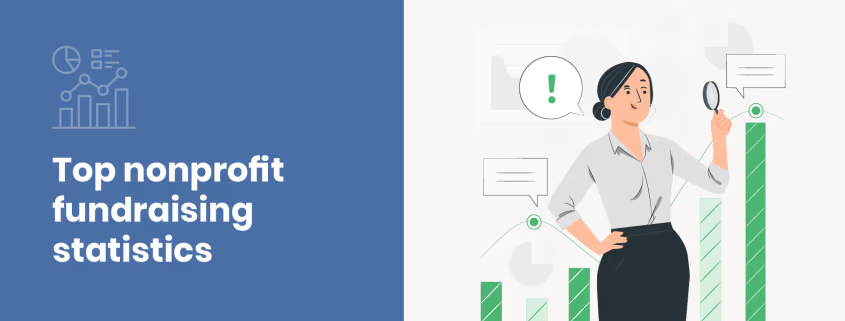Top Nonprofit Fundraising Statistics to Know: Updated 2025
Fundraising is necessary for your nonprofit’s survival, but it’s also a resource- and time-intensive process. To help your organization understand what impacts donors’ decision to give, we’ve compiled some of the top nonprofit fundraising statistics to understand.
We’ve broken these stats into relevant categories to help you where you need it most:
- Overall Fundraising Statistics
- Email Fundraising Statistics
- Social Media Fundraising Statistics
- Online Donation Statistics
- Recurring Giving Statistics
- Mobile Giving Statistics
- Year-End Giving Statistics
- Corporate Giving Statistics
Note that while most of these statistics focus on donors in the United States and Canada, much of this information and the lessons they teach are relevant worldwide. Let’s jump in!
1. Overall Fundraising Statistics
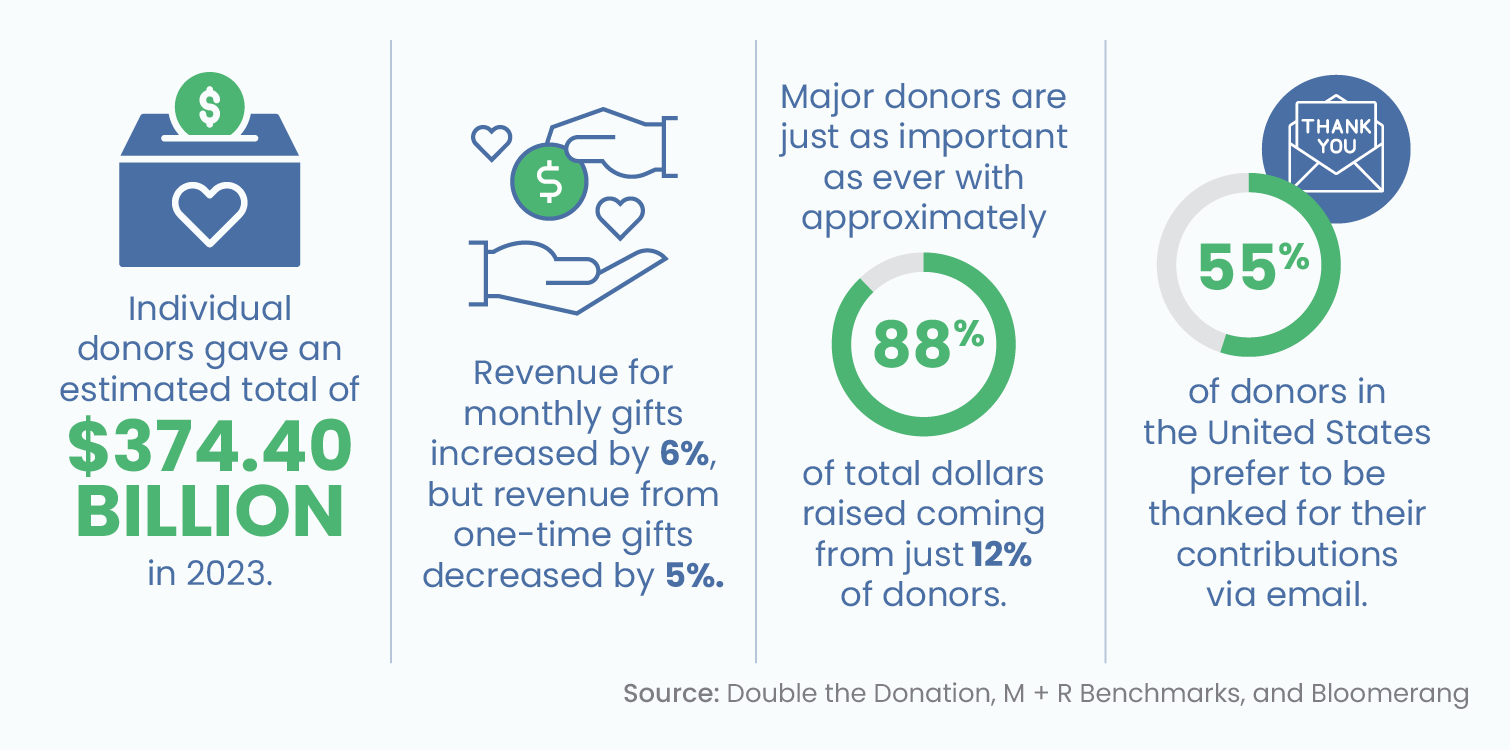
Here are some key overall fundraising statistics to help illustrate the current state of giving:
- Individual donors gave an estimated total of $374.40 billion in 2023, representing 67% of the $557.16 billion total giving. When compared to the $319.04 billion given in 2022, the overall amount increased by 1.9%. However, taking inflation into account, total giving actually declined by 2.1%.
- Overall fundraising decreased in 2023 among all donor groups. In particular, major donor giving decreased by 10%.
- Revenue for monthly gifts increased by 6%, but revenue from one-time gifts decreased by 5%.
- Millennial donors say making a difference with their donations is the number one reason they give. Additionally, two-thirds of millennials state they track the results of the nonprofits they support compared to just one-third of baby boomers.
- Major donors are just as impactful as ever with approximately 88% of total dollars raised coming from just 12% of donors.
- Mid-level donors tend to be exceptionally loyal, with 52% giving to the same cause for over a decade. Additionally, 31% have made a bequest, and 23% are in the process of doing so.
- 55% of donors in the United States prefer to be thanked for their contributions via email.
- The average donor age is 75. However, household income is a stronger indicator of the likelihood of giving with about 80% of households with an annual income of 250k or higher donating.
- Location matters with about 80% of donors giving to local organizations.
- Giving for all types of nonprofits has increased with educational institutions, foundations, and public-society organizations seeing the highest increases. However, giving to individuals has decreased by 17.2%.
- 100% of nonprofits surveyed increased their fundraising through challenge matches.
The takeaway? Pay attention to your individual donors’ preferences to cultivate lasting and valuable relationships.
2. Email Fundraising Statistics
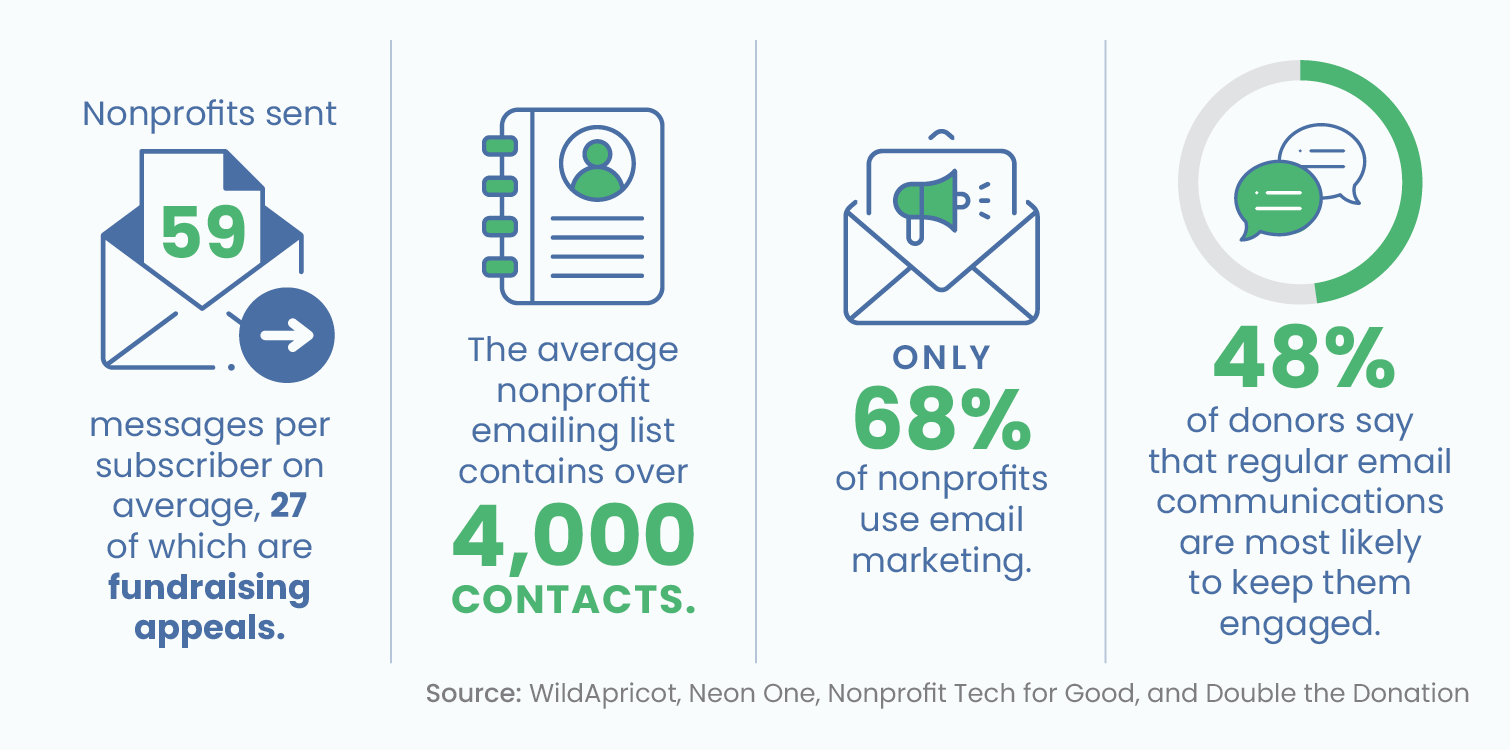
Here are some important email fundraising statistics to note:
- Response rates to fundraising emails are on the decline, dropping 10% for advocacy emails and 16% for fundraising emails when compared to 2022. However, the number of subscribers on nonprofit email lists has increased by 7%.
- Nonprofits sent 59 email messages per subscriber on average, 27 of which were fundraising appeals.
- The average nonprofit emailing list contains over 4,000 contacts.
- On average nonprofits raised $76 for every 1,000 emails sent in 2023. This is a 15.56% decrease from $90 in 2022.
- Email open rates for nonprofits are unreliable as Apple’s 2021 privacy policy update can lead to false open reports for Apple device users.
- Only 68% of nonprofits use email marketing. Of those nonprofits, 41% send newsletters monthly, 27% quarterly, 17% twice monthly, 10% weekly, 3% twice weekly, and 2% daily.
- Email communications sent on a regular basis are most likely to encourage repeat donations from donors, with 48% of donors reporting that regular email communications are most likely to keep them engaged.
- Approximately 6.8% of all nonprofit emails bounce. This means email appends can be useful for nonprofits looking to connect with supporters via this channel.
The takeaway? Email is facing challenges, but it can still be an effective communication strategy when done strategically. Curate your content, be intentional with what your fundraising emails say, and segment your donors effectively.
3. Social Media Fundraising Statistics
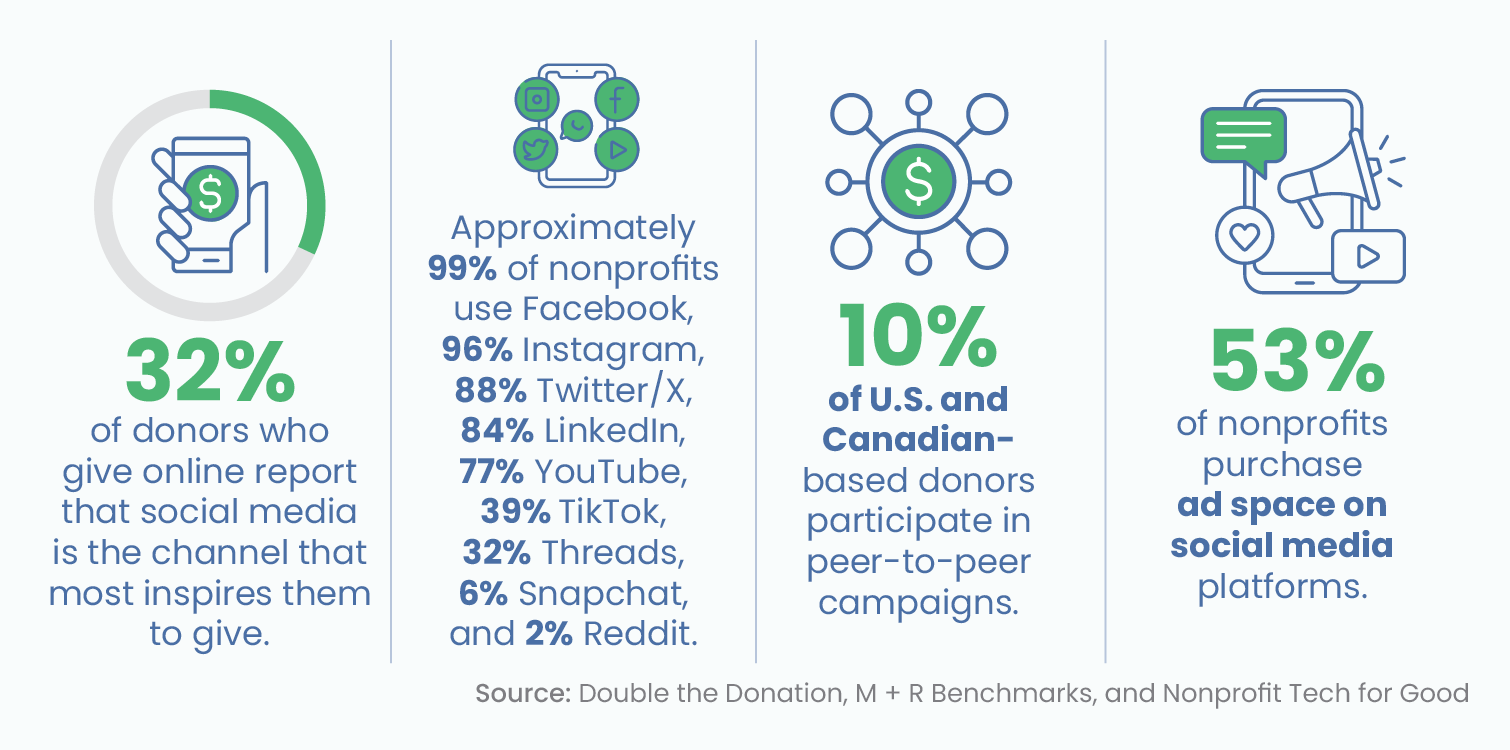
These are some of the top social media fundraising statistics:
- 32% of donors who give online report that social media is the channel that most inspires them to give.
- Nonprofits have widely adopted social media. Approximately 99% of nonprofits use Facebook, 96% use Instagram, 88% use Twitter/X, 84% use LinkedIn, 77% use YouTube, 39% use TikTok, 32% use Threads, 6% use Snapchat, and 2% use Reddit.
- On average, nonprofits post on Facebook 5.95 times per week, 4.9 times on Instagram, 6.97 times on Twitter/X, and 1.59 times on TikTok.
- When it comes to content, posts that evoke a joyful emotional response are the most widely shared.
- 62% of donors who give to crowdfunding campaigns are new to crowdfunding.
- 10% of U.S. and Canadian-based donors participate in peer-to-peer campaigns.
- According to nonprofit marketers, social media is the second most effective digital fundraising tool nonprofits have just after their organization’s websites.
- Spending on search engine and social media ads made up 80% of nonprofit marketing budgets.
- 53% of nonprofits purchase ad space on social media platforms. However, increased ad spending does not always result in a higher return on investment, as it was found that spending more on ads for nonprofit events does not correlate with higher event income.
- When it comes to the future of social media platforms, 23% of marketers say Instagram is the top platform for growth, 19% say TikTok, 18% say Facebook, 15% say YouTube, 7% say LinkedIn, and 6% say Twitter/X.
The takeaway? Social media is a viable marketing platform that can drive revenue if it’s backed up with the right content and engagement strategies. Otherwise, it can waste your nonprofit’s time and money. Post joyful content, understand what platforms your audience uses, and rethink purchasing social media ads if it’s not necessary for successfully reaching your audience.
4. Online Donation Statistics
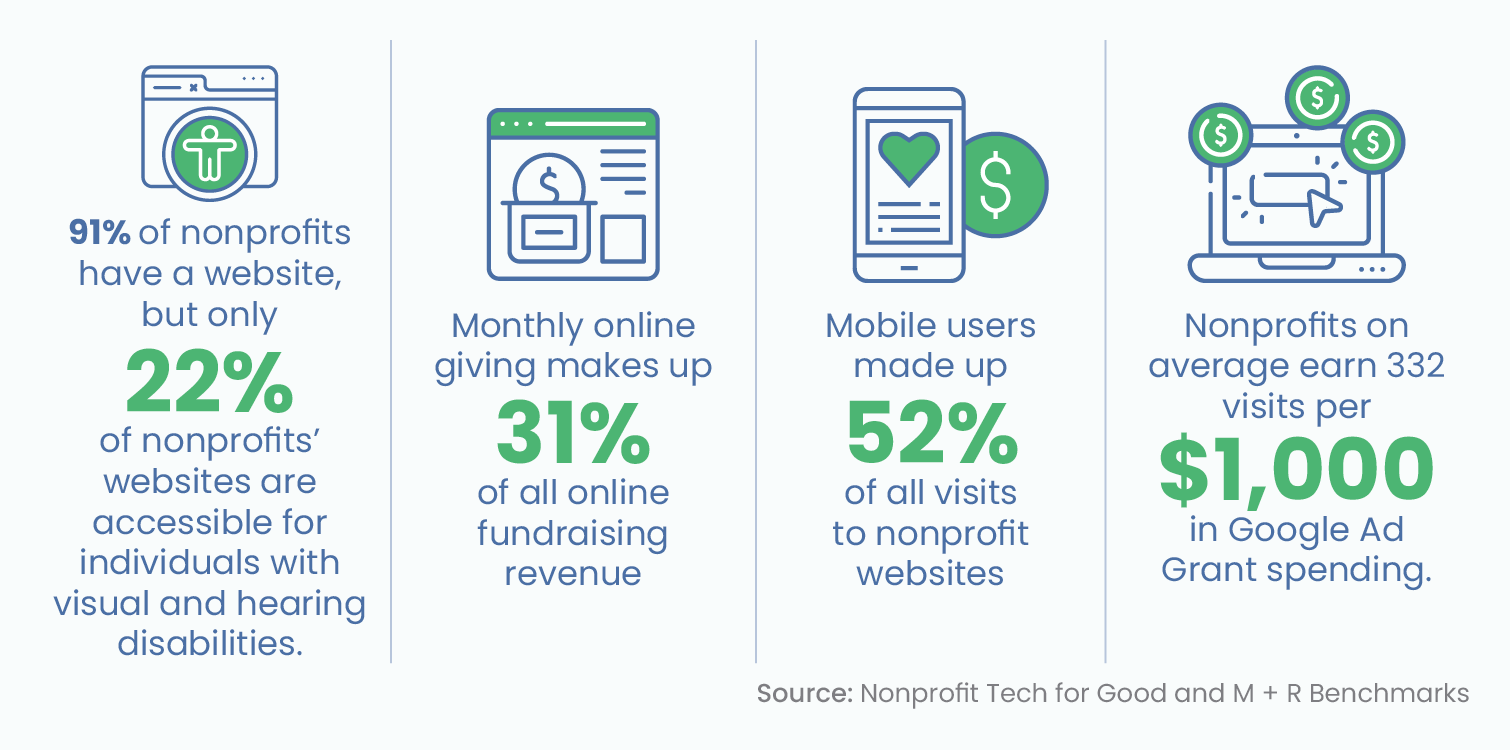
Check out these top online fundraising statistics:
- 91% of nonprofits have a website, but only 22% of nonprofits’ websites are accessible to individuals with visual and hearing disabilities.
- Monthly online giving makes up 31% of all online fundraising revenue, up from 27% in 2022.
- 63% of donors prefer to give online with a credit or debit card, followed by direct mail (16%), PayPal (10%), wire transfer (5%), cash (4%), digital wallet (1%), and text-to-give (1%).
- There are more than 3.4 billion digital wallet users worldwide. By 2026, the number of global digital wallet users is expected to reach 5.2 billion, which is over 60% of the global population.
This makes it important to offer mobile wallets like Apple Pay, PayPal, and Google Pay as a donation option. - 94% of nonprofits have mobile-optimized websites.
- Mobile users represented 52% of all visits to nonprofit websites, but desktop users were responsible for the majority of donations at 67% and contributed 78% of revenue.
- Organic visitors to a nonprofit’s website (those who arrived via searching a specific keyword in a search engine and clicking on a non-paid link) made up 44% of total nonprofit web traffic last year.
- While nonprofits need to be cautious about buying ad space, nonprofits earn an average of 332 visits per $1,000 in Google Ad Grant spending. Small nonprofits have been especially successful at leveraging these free funds with an average of 488 visits per $1,000 spent.
When it comes to website security, 84% of nonprofits have an SSL certificate for their website, 68% of nonprofits have a plan in place in the event of a cyberattack, and 27% have experienced cyberattacks.
The takeaway? our website is the foundation for everything your nonprofit does, such as fundraising, promoting events, and communicating with your community. Even when other marketing channels have exciting opportunities, don’t neglect your website. Instead, make sure its design, functionality, and donor experience are high-quality.
5. Recurring Giving Statistics
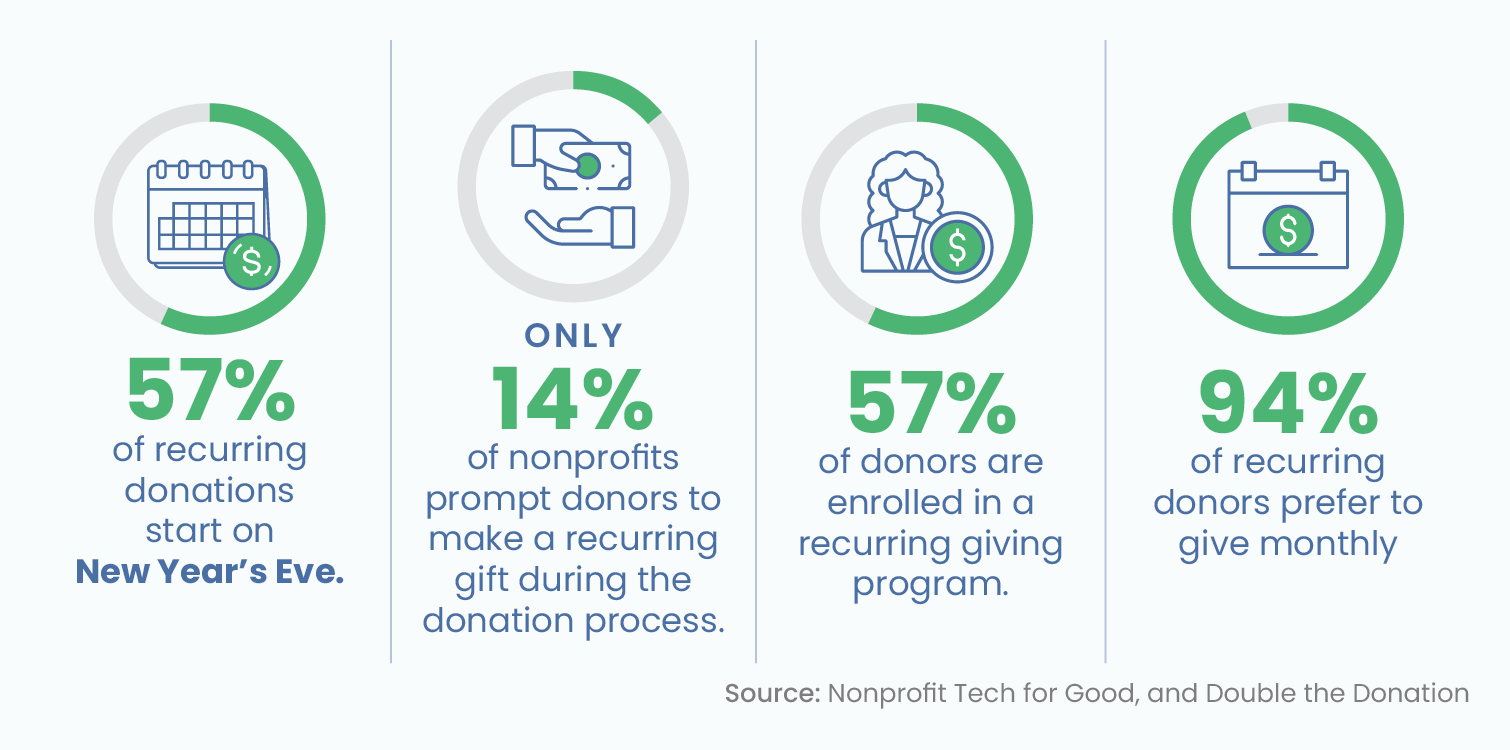
Here are some important recurring giving statistics to note:
- While revenue from one-time online giving decreased by 5% in 2023, revenue from monthly giving increased by 6% and accounted for 31% of all online giving.
- The average monthly gift is $24, resulting in an annual donation total of $288, outpacing the average one-time gift of $115.
- Holidays are an effective time to cultivate recurring gifts, with 57% of recurring donations starting on New Year’s Eve.
- Only 14% of nonprofits prompt donors to make their donation a recurring gift during the donation process.
- 91% of organizations stop acknowledging recurring gifts by the third month.
- 1 in 4 nonprofit organizations don’t try to re-secure a recurring donation after a credit card number changes.
- A pop-up message asking donors to make their one-gift gift a recurring gift results in a 64% increase in monthly donations.
- The donor retention rate in 2023 was 44%, meaning that about half of donors in 2022 gave again the following year. For new donors, the retention rate was just 23%, but for prior donors (those who have a multi-year history of giving), it rose to 61%.
- 57% of donors are enrolled in a recurring giving program, up 46% from the previous year.
- 94% of recurring donors prefer to give monthly, 3% weekly, 2% annually, and 1% quarterly.
The takeaway? Encouraging recurring gifts is the single best and simplest thing you can do to grow your giving program sustainably. The fact that so few nonprofits ask for recurring gifts is shocking, so don’t be one of those organizations! Make active asks, steward, and thank your donors for their contributions, and survey them to learn more about their giving preferences.
6. Mobile Giving Statistics
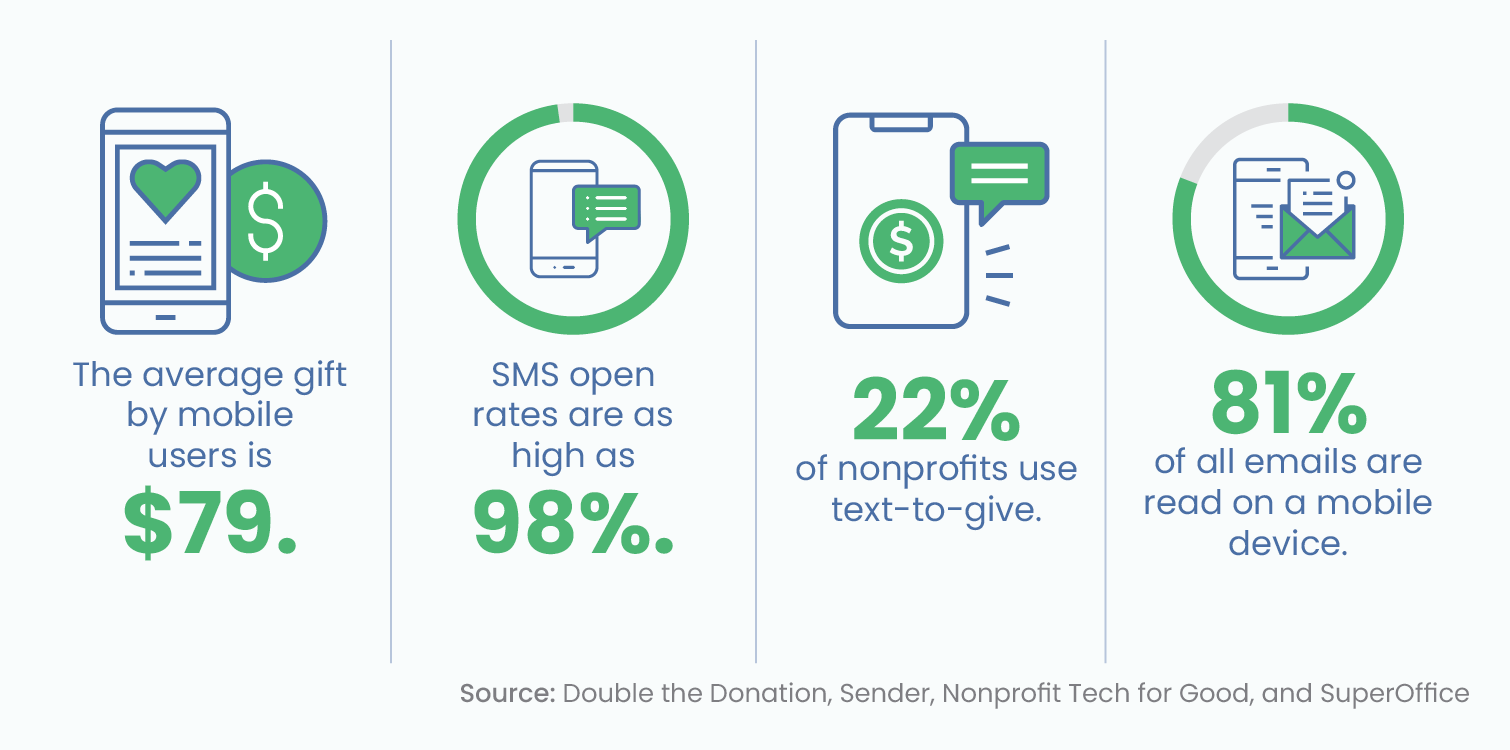
Here are some important mobile giving statistics:
- The average gift by mobile users is $79, tablet users give $96, and desktop users give $118.
- Net growth for mobile messaging subscriber lists increased by 7% in 2022 and by 5% in 2023, showing continued but slowed growth.
- For every 1,000 mobile messages sent, nonprofits raised $92.
- SMS open rates are as high as 98%.
- On average, 7.7 fundraising appeals and 4 advocacy messages were sent per subscriber per year with the majority being sent during the year-end giving season.
- 81% of all emails are read on a mobile device.
- 94.4% of millennials and 98% of Gen Z own a smartphone. Plus, half of all U.S. citizens spend a daily average of 5-6 hours on their smartphones.
- 22% of nonprofits utilize text-to-give.
- Revenue for mobile messages increased by 14% in 2023.
The takeaway? Mobile internet usage and donations are just as, if not more, popular as desktop giving. Expand your outreach through text messaging, check that you have accurate contact information with email and phone appends, and make sure your website is mobile-friendly. Use your mobile fundraising appeals intentionally, such as during events. Broad text campaigns can work, but only if your content and timing are right, such as texting for support in the wake of a natural disaster.
7. Year-End Giving Statistics
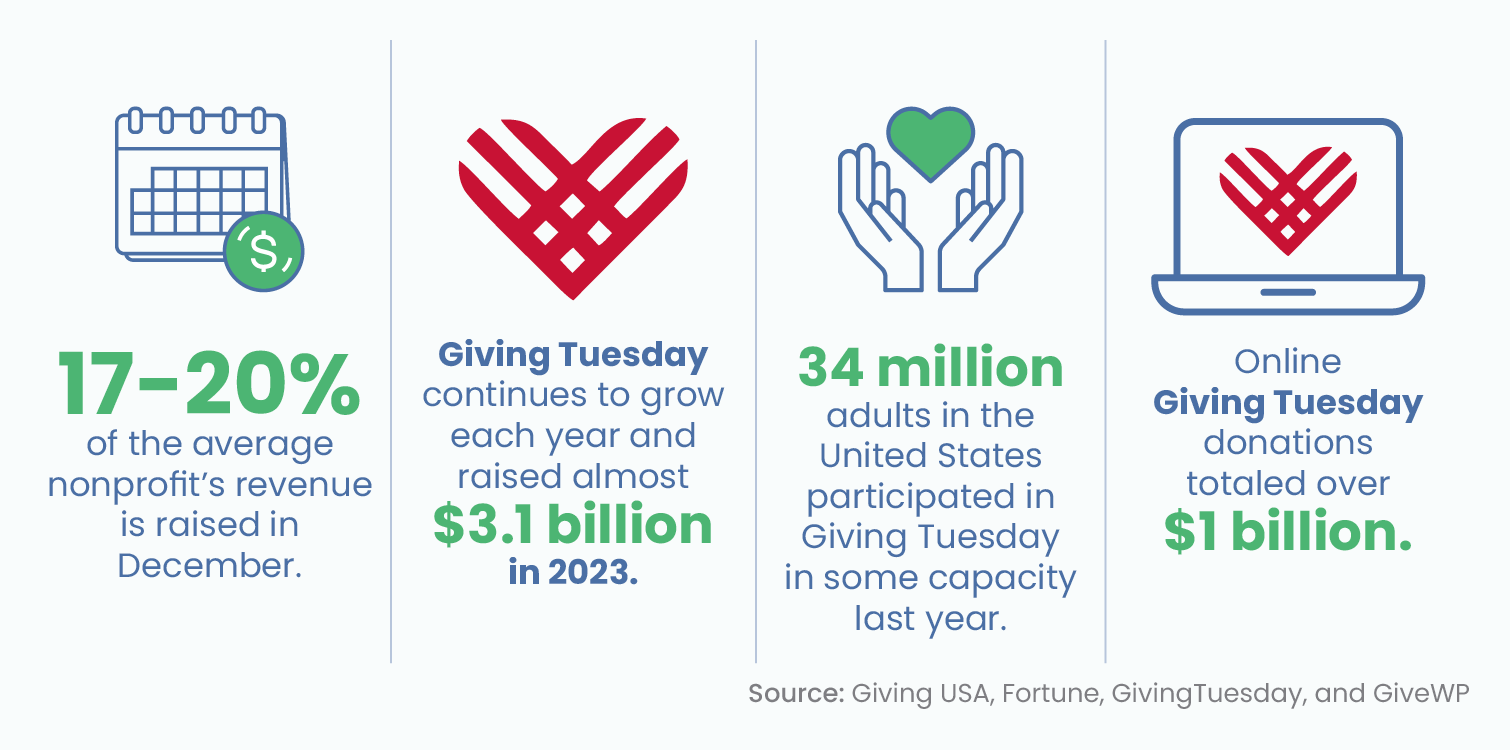
Here are some key year-end giving statistics:
- 17-20% of the average nonprofit’s revenue is raised in December, and there’s a notable fundraising spike on the last day of the month.
- Giving Tuesday raised almost $3.1 billion last year, over $1 billion of which was from online giving.
- 10% fewer donors participated in Giving Tuesday than the previous year.
- 34 million adults in the United States participated in Giving Tuesday in some capacity last year, whether they donated, fundraised on behalf of an organization, or took another action.
- Giving Tuesday posts generated more than 20 billion social media impressions.
- 82% of nonprofits that participated in Giving Tuesday tried out a new fundraising or marketing strategy.
The takeaway? The end of the year is the most important time to fundraise. Plan your year-end fundraising strategy months in advance to be ready for Giving Tuesday and the holiday season. This is also a good time to try out new messaging strategies since engagement is likely to be high at this time of the year. However, since the total number of donors has declined in recent years, prioritizing retention might be the smart choice for next Giving Tuesday.
8. Corporate Giving Statistics
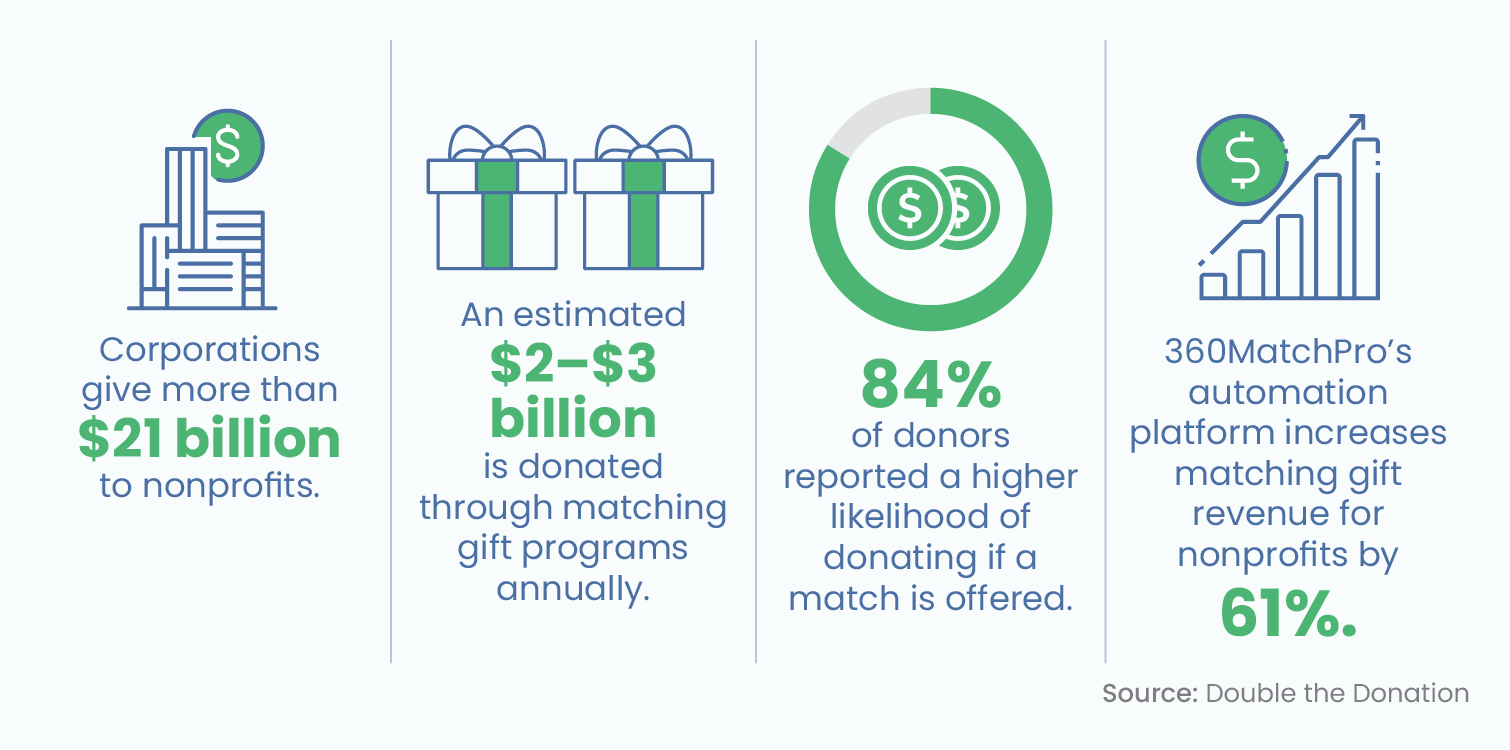
Take a look at these noteworthy corporate giving statistics:
- Corporations give more than $21 billion to nonprofits.
- While an estimated $2–$3 billion is donated through matching gift programs annually, more than $6–$10 billion in available matching gift funding goes unclaimed each year.
- Over 26 million individuals work for companies with matching gift programs. However, 78% of these donors are unaware of whether their company offers a matching gift program or what the specific participation guidelines and details are.
- 40% of Fortune 500 companies offer volunteer grant programs.
- The percentage of Russell 1000 companies that publicly disclose that they offer employee matching gifts grew by 11.8% in the last three years, reaching 51%.
- The percentage of Russell 1000 companies offering an “Unrestricted Matching Gift Program” grew over 48% over the last three years, while Russell 1000 Companies offering “Restricted” programs decreased by 33% to only 13.6% in the same time frame.
- 97% of donors want flexibility in where and how they give to causes they care about. Donors want the option to give directly to a nonprofit and for their company to allow matching gifts for any nonprofit of their choosing.
- 84% of donors reported a higher likelihood of donating if a match is offered, and 1 in 3 donors indicated they’d make a larger gift if matching is applied to their donation.
- 360MatchPro’s automation platform increases matching gift revenue for nonprofits by 61%.
- Double the Donation’s database covers 93-99% of Canadian employees who work for matching gift companies.
The takeaway? Corporate philanthropy, and specifically workplace giving, offers a powerful fundraising source, though it continues to be underused by nonprofits everywhere. Matching gifts are a particularly easy way to get started, so start pursuing these opportunities.
Additional Resources on Nonprofit Fundraising
Statistics provide your nonprofit with a useful baseline to measure your efforts and make strategic decisions about future projects. When exploring statistics, remember to take the full range of nonprofits—from one-man teams to globe-spanning operations—into account. This means most nonprofits will find themselves perfectly aligned with some stats and straying far from others.
To get an even stronger understanding of modern nonprofit and fundraising statistics, explore these resources:
- 15+ Powerful CSR Statistics About The Impact of Giving Back. Understanding the state of corporate social responsibility and company giving can help your nonprofit better connect with businesses. Discover statistics related to CSR to stay up to date.
- 5 Trends in Corporate Philanthropy That Dictate the Future. Corporate philanthropy is changing, and staying on top of trends with this guide can help your nonprofit secure corporate funding.
- Volunteering Statistics for 2024: Explore Key Insights. Volunteers play an essential role in your nonprofit’s success. Learn how volunteer strategies are shifting with these statistics.

